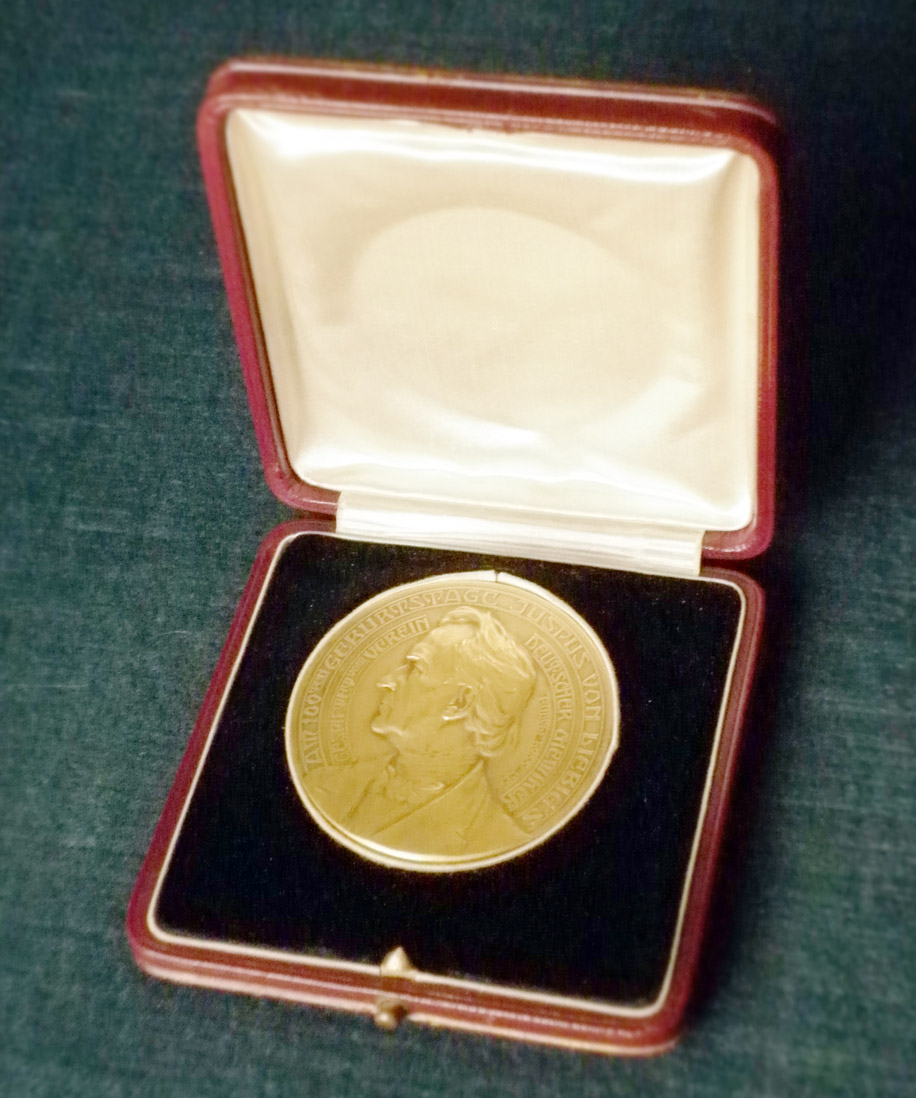Liebig Medal on:
[Wikipedia]
[Google]
[Amazon]
 The Liebig Medal (German: ''Liebig-Denkmünze'') was established by the (''Verein Deutscher Chemiker'') in 1903 to celebrate the centenary of Justus von Liebig. Since 1946 it has been awarded by the Society of German Chemists (''Gesellschaft Deutscher Chemiker'', GDCh).
The Liebig Medal (German: ''Liebig-Denkmünze'') was established by the (''Verein Deutscher Chemiker'') in 1903 to celebrate the centenary of Justus von Liebig. Since 1946 it has been awarded by the Society of German Chemists (''Gesellschaft Deutscher Chemiker'', GDCh).
Gesellschaft Deutscher Chemiker (GDCh)
* 1903
 The Liebig Medal (German: ''Liebig-Denkmünze'') was established by the (''Verein Deutscher Chemiker'') in 1903 to celebrate the centenary of Justus von Liebig. Since 1946 it has been awarded by the Society of German Chemists (''Gesellschaft Deutscher Chemiker'', GDCh).
The Liebig Medal (German: ''Liebig-Denkmünze'') was established by the (''Verein Deutscher Chemiker'') in 1903 to celebrate the centenary of Justus von Liebig. Since 1946 it has been awarded by the Society of German Chemists (''Gesellschaft Deutscher Chemiker'', GDCh).
Recipients
SourceGesellschaft Deutscher Chemiker (GDCh)
* 1903
Adolf von Baeyer
Johann Friedrich Wilhelm Adolf von Baeyer (; 31 October 1835 – 20 August 1917) was a German chemist who synthesised indigo and developed a nomenclature for cyclic compounds (that was subsequently extended and adopted as part of the IUPAC org ...
, Munich
* 1904 Rudolf Knietsch, Ludwigshafen
* 1905 Eduard Buchner
Eduard Buchner (; 20 May 1860 – 13 August 1917) was a German chemist and zymologist, awarded the 1907 Nobel Prize in Chemistry for his work on fermentation.
Biography
Early years
Buchner was born in Munich to a physician and Doctor Extraor ...
, Würzburg
* 1907 Adolph Frank, Berlin
* 1908 Otto Schönherr, Dresden
* 1909 Otto Schott
Friedrich Otto Schott (1851–1935) was a German chemist, glass technologist, and the inventor of borosilicate glass. Schott systematically investigated the relationship between the chemical composition of the glass and its properties. In this wa ...
, Jena
* 1911 Paul Ehrlich
Paul Ehrlich (; 14 March 1854 – 20 August 1915) was a Nobel Prize-winning German physician and scientist who worked in the fields of hematology, immunology, and antimicrobial chemotherapy. Among his foremost achievements were finding a cure ...
, Frankfurt am Main
* 1912 Carl Dietrich Harries
Carl Dietrich Harries (5 August 1866 – 3 November 1923) was a German chemist born in Luckenwalde, Brandenburg, Prussia. He received his doctorate in 1892. In 1900, he married Hertha von Siemens, daughter of the electrical genius Werner von Sie ...
, Berlin
* 1913 Emil Ehrensberger, Traunstein
* 1914 Fritz Haber
Fritz Haber (; 9 December 186829 January 1934) was a German chemist who received the Nobel Prize in Chemistry in 1918 for his invention of the Haber–Bosch process, a method used in industry to synthesize ammonia from nitrogen gas and hydroge ...
, Berlin
* 1919 Carl Bosch
Carl Bosch (; 27 August 1874 – 26 April 1940) was a German chemist and engineer and Nobel Laureate in Chemistry. He was a pioneer in the field of high-pressure industrial chemistry and founder of IG Farben, at one point the world's largest ...
, Ludwigshafen
* 1921 Max Planck
Max Karl Ernst Ludwig Planck (, ; 23 April 1858 – 4 October 1947) was a German theoretical physicist whose discovery of energy quanta won him the Nobel Prize in Physics in 1918.
Planck made many substantial contributions to theoretical p ...
, Berlin
* 1922 Wilhelm Normann
Wilhelm Normann (16 January 1870, in Petershagen – 1 May 1939, in Chemnitz) (sometimes also spelled ''Norman'') was a German chemist who introduced the hydrogenation of fats in 1901, creating what later became known as trans fats. This inventi ...
, Chemnitz
* 1924 Max Schroeder, Berlin
* 1925 Gustav Heinrich Johann Apollon Tammann
Gustav Heinrich Johann Apollon Tammann ( – 17 December 1938) was a prominent Baltic German chemist-physicist who made important contributions in the fields of glassy and solid solutions, heterogeneous equilibria, crystallization, and metallurg ...
, Göttingen
* 1926 Robert-Emanuel Schmidt, Wuppertal-Elberfeld
* 1927 Fritz Raschig, Ludwigshafen
* 1928 Friedrich Bergius
Friedrich Karl Rudolf Bergius (, 11 October 1884 – 30 March 1949) was a German chemist known for the Bergius process for producing synthetic fuel from coal, Nobel Prize in Chemistry (1931, together with Carl Bosch) in recognition of contribu ...
, Heidelberg
* 1929 Hans Fischer
Hans Fischer (; 27 July 1881 – 31 March 1945) was a German organic chemist and the recipient of the 1930 Nobel Prize for Chemistry "for his researches into the constitution of haemin and chlorophyll and especially for his synthesis of ha ...
, München
* 1930 Otto Ruff
Otto Ruff (12 December 1871 – 17 September 1939) was a German chemist.
Life
Otto Ruff was born in Schwäbisch Hall, Württemberg. After becoming a pharmacist under the supervision of Carl Magnus von Hell (known from the Hell-Volhard-Zelinsky ...
, Breslau
* 1931 Friedrich Emich
Friedrich Emich (5 September 1860 – 22 January 1940) was an Austrian chemist. Emich is recognized as the founder of microchemistry and worked at Graz University of Technology. Together with his colleague from the University of Graz, Fritz ...
, Graz; Ida Noddack
Ida Noddack (25 February 1896 – 24 September 1978), '' née'' Tacke, was a German chemist and physicist. In 1934 she was the first to mention the idea later named nuclear fission. With her husband - Walter Noddack - and Otto Berg she discov ...
and Walter Noddack
Walter Noddack (17 August 1893 – 7 December 1960) was a German chemist. He, Ida Tacke (who later married Noddack), and Otto Berg reported the discovery of element 43 and element 75 in 1925.
Rhenium
They named element 75 rhenium (Latin ''Rh ...
, Berlin